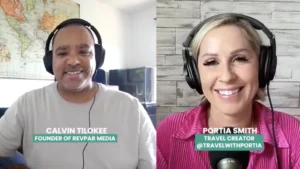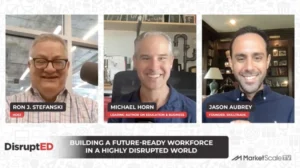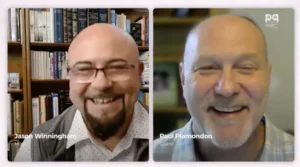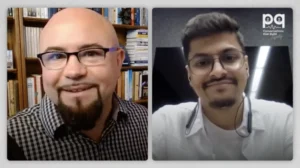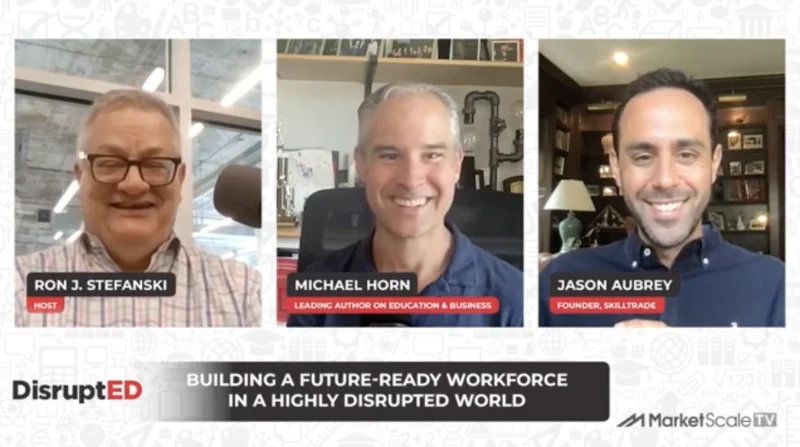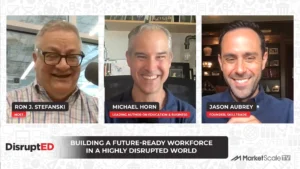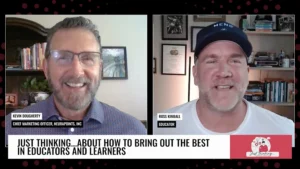Follow us on social media for the latest updates in B2B!
Twitter – @MarketScale
Facebook – facebook.com/marketscale
LinkedIn – linkedin.com/company/marketscale
3 Ways Higher Education Leaders can Move into the Future
COVID-19 has created new financial and operational challenges for higher education leaders, and has accelerated the impact of long-standing demographic, organizational, and economic trends, according to a new whitepaper.
Released by TIAA and EY-Parthenon, “The new normal: Higher education in a post-COVID-19 world” was the focus of a panel at the TIAA Institute Virtual Higher Education Symposium.
During the event, leaders from Bucknell University, Rutgers University, and St. Olaf College shed light on how institutions and higher education leaders can adapt to their new realities and ensure higher education remains attractive for future generations of students.
“The COVID-19 pandemic is rapidly transforming the higher education industry. While the challenges vary among institutions, leaders are finding ways to adapt and address the needs of current and prospective students,” said Christina Cutlip, Senior Managing Director, Head of Client Engagement & National Advocacy at TIAA. “At TIAA, we are committed to helping higher education leaders navigate this new reality so they can continue to create spaces for young people to develop valuable skills and grow into exceptional citizens.”The virtual event, hosted by the TIAA Institute, featured a discussion about the current challenges facing the higher education leaders and institutions and the impact of the pandemic on human, financial, physical, and capital for institutions of all sizes.
The conversation touched on several trends, including a renewed emphasis on diversity, equity, and inclusion (DEI) practices, greater reliance on an institution’s core mission, and faster and more agile decision-making processes.
Participants also discussed:
• Imagining the evolution and future of institutions: Higher education leaders will need to be agile as they adapt to the shifting environment, meet students’ and faculty’s evolving needs, and provide safe and equitable spaces that foster growth. Achieving a desired future state requires revisiting institutions’ value propositions and considering a sharpened focus on mission-critical programming that aligns with their goals. This may mean cutting non-essential areas of study, providing flexible hybrid and online curriculum, building interdisciplinary schools, or offering shorter degree pathways and certificate programs that align with the future workforce.
• Flexing human and financial capital: As institutions evolve, they may need to align their human and financial resources to new priorities. This may mean redeploying employees into new areas that align with their talents and campus needs and renewing focus on DEI initiatives, including recruiting diverse faculty through non-traditional job markets and ensuring new hires match their institutions’ DEI values. It will also be important for higher education leaders and institutions to think beyond traditional 12-month budget cycles. The pandemic has made it apparent that in some cases, short-term budget planning and liquidity is needed. However, maintaining a focus on financial decisions that have long-term benefits over a 3 to 5-year time horizon, as higher education adjusts to a new normal, will be necessary for strategic and intentional planning.
• Engaging strategic partners: Institutions are considering new or expanded ways to work with outside partners. Examples include implementing wellness programs that help students and faculty avoid burnout and manage remote lifestyles or building curricula that provide new pathways for local corporations to hire students. As institutions revisit their value propositions, they might also consider outsourcing less-mission critical priorities to strategic partners.
“The pandemic has accelerated existing headwinds in higher education,” said Haven Ladd, Principal, EY-Parthenon, Ernst & Young LLP. “Leaders across the sector have a unique opportunity to drive institutional transformation, both near- and long-term. COVID-19 may well usher in a new era of higher education, one that is defined by agile thinking, holistic planning and a renewed commitment to the sector’s deep financial and social purpose.”
—
Be sure to subscribe to our industry publication for the latest news, videos, and podcasts in the Education & Technology Industry.


